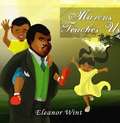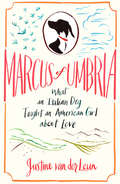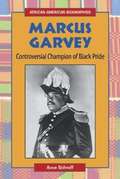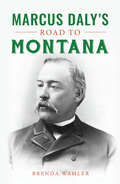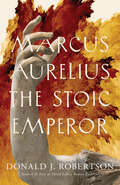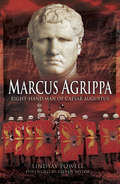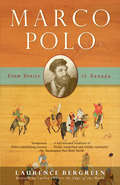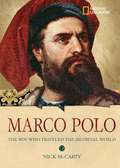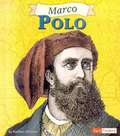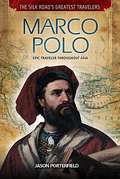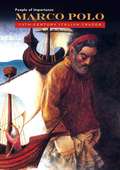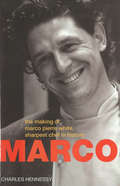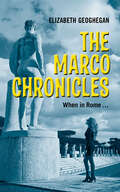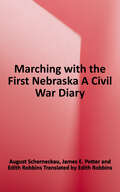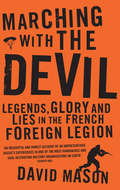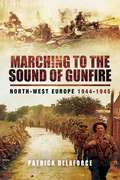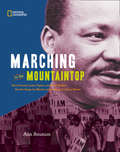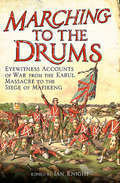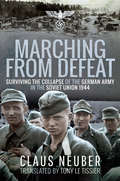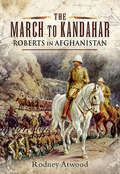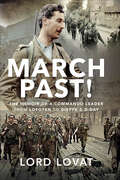- Table View
- List View
Marga Richter
by Sharon MirchandaniThis is the first full-length introduction to the life and works of significant American composer Marga Richter (born 1926), who has written more than one hundred works for orchestra, chamber ensemble, dance, opera, voice, chorus, piano, organ, and harpsichord. Still actively composing in her eighties, Richter is particularly known for her large-scale works performed by ensembles such as the London Philharmonic Orchestra and the Civic Orchestra of Chicago and for other pieces performed by prominent artists including pianist Menahem Pressler, conductor Izler Solomon, and violinist Daniel Heifetz. Interspersing consideration of Richter's musical works with discussion of her life, her musical style, and the origins and performances of her works, Sharon Mirchandani documents a successful composer's professional and private life throughout the twentieth century. Covering Richter's formative years, her influences, and the phases of her career from the 1950s to the present, Mirchandani closely examines Richter's many interesting, attractive musical works that draw inspiration from distinctly American, Irish/English, and Asian sources. Drawing extensively on interviews with the composer, Mirchandani also provides detailed descriptions of Richter's scores and uses reviews and other secondary sources to provide contexts for her work, including their relationship to modern dance, to other musical styles, and to 1970s feminism.
Marcus Teaches Us
by Eleanor Wint<p>Marcus Teaches Us is the first and only book of its kind. It portrays the teachings of The Hon. Marcus Mosiah Garvey in language and pictures that all kids will love. It is bright with innovative colouring activities, uses simple language and gives children the opportunity to practice cursive writing. Marcus Garvey is a monumental, internationally acclaimed Black philosopher who has influenced the independence movement of every black nation in the world. Children worldwide should each have their own copy as they deserve to have the knowledge captured in this attractive book on Marcus Garvey.</p> <P><P><i>Advisory: Bookshare has learned that this book offers only partial accessibility. We have kept it in the collection because it is useful for some of our members. To explore further access options with us, please contact us through the Book Quality link. Benetech is actively working on projects to improve accessibility issues such as these.</i>
Marcus of Umbria: What an Italian Dog Taught an American Girl about Love
by Justine van der LeunReaders will delight in this tale of an urbanite who leaves her magazine job to move to Collelungo, Italy, population: 200. There, in the ancient city center of a historic Umbrian village, she sets up house with the enticing local gardener she met on vacation only weeks earlier. This impulsive decision launches an eye-opening series of misadventures when village life and romance turn out to be radically different from what she had imagined.Love lost with the gardener is found instead with Marcus, an abandoned English pointer that she rescues. With Marcus by her side, Justine discovers the bliss and hardship of living in the countryside: herding sheep, tending to wild horses, picking olives with her adopted Italian family, and trying her best to learn the regional dialect. The result is a rich, comic, and unconventional portrait about learning to live and love in the most unexpected ways.
Marcus Garvey: Controversial Champion of Black Pride
by Anne SchraffChronicles the life of Marcus Garvey, a fiery black leader who began a crusade for African Americans to fight against oppression in the early years of the twentieth century.
Marcus Daly's Road to Montana
by Brenda WahlerThe Making of a Copper King!Born in 1841 to tenant farmers, Marcus Daly came from ruralIreland to New York as a boy. Having learned the big city&’s harsh lessons, he traveled west to the gold and silver mining camps ofCalifornia, Nevada, Utah and Montana. Then, a spectacular discovery in the Anaconda mine him one of Montana&’s famed Copper Kings. Yet, his early life remained shrouded in myth. Famed for his machinations in state politics and shaping Butte into the &“Richest Hill on Earth,&” his path from farm boy to mining king has been overlooked. For the first time, author Brenda Wahler brings his secretive and formative early years to life.
Marcus Aurelius: The Stoic Emperor (Ancient Lives)
by Donald J. RobertsonExperience the world of Roman emperor Marcus Aurelius and the tremendous challenges he faced and overcame with the help of Stoic philosophy This novel biography brings Marcus Aurelius (121–180 CE) to life for a new generation of readers by exploring the emperor&’s fascinating psychological journey. Donald J. Robertson examines Marcus&’s relationships with key figures in his life, such as his mother, Domitia Lucilla, and the emperor Hadrian, as well as his Stoic tutors. He draws extensively on Marcus&’s own Meditations and correspondence, and he examines the emperor&’s actions as detailed in the Augustan History and other ancient texts. Marcus Aurelius struggled to reconcile his philosophy and moral values with the political pressures he faced as emperor at the height of Roman power. Robertson examines Marcus&’s attitude toward slavery and the moral dilemma posed by capturing enemies in warfare; his attitude toward women; the role of Stoicism in shaping his response to the threat of civil war; the treatment of Christians under his rule; and the naming of his notorious son Commodus as his successor. Throughout, the Meditations is used to shed light on the mind of the emperor—his character, values, and motives—as Robertson skillfully weaves together Marcus&’s inner journey as a philosopher with the outer events of his life as a Roman emperor.
Marcus Agrippa: Right-hand Man of Caesar Augustus
by Lindsay PowellMarcus Agrippa personified the term 'right-hand man'. As Emperor Augustus' deputy, he waged wars, pacified provinces, beautified Rome, and played a crucial role in laying the foundations of the Pax Romana for the next two hundred years but he served always in the knowledge he would never rule in his own name. Why he did so, and never grasped power exclusively for himself, has perplexed historians for centuries.In his teens he formed a life-long friendship with Julius Caesar's great nephew, Caius Octavius, which would change world history. Following Caesar's assassination on the Ides of March 44 BC, Agrippa was instrumental in asserting his friend's rights as the dictator's heir. He established a reputation as a bold admiral, defeating Sextus Pompeius at Mylae and Naulochus (36 BC), culminating in the epoch-making Battle of Actium (31 BC), which eliminated Marcus Antonius and Queen Cleopatra as rivals. He proved his genius for military command on land by ending bloody rebellions in the Cimmerian Bosporus, Gaul, Hispania and Illyricum.In Gaul Agrippa established the vital road network that helped turn Julius Caesar's conquests into viable provinces. As a diplomat, he befriended Herod the Great of Judaea and stabilised the East. As minister of works he overhauled Rome's drains and aqueducts, transformed public bathing in the city, created public parks with great artworks and built the original Pantheon.Agrippa became co-ruler of the Roman Empire with Augustus and married his daughter Julia. His three sons were adopted by his friend as potential heirs to the throne. Agrippa's unexpected death in 12 BC left Augustus bereft, but his bloodline lived on in the imperial family, through Agrippina the Elder to his grandson Caligula and great grandson Nero.MARCUS AGRIPPA is lucidly written by the author of the acclaimed biographies Eager for Glory and Germanicus. Illustrated with colour plates, figures and high quality maps, Lindsay Powell presents a penetrating new assessment of the life and achievements of the multifaceted man who put service to friend and country before himself.A gripping, thoroughly researched and hugely impressive biography of a key player in the transition from the Roman Republic to Augustus's Empire'. Saul David, University of Buckingham, author of WAR: From Ancient Egypt to Iraq.Augustus' ascent and reign are unthinkable without Marcus Agrippa. Surprisingly, there has been no biography of Agrippa in English for some eighty years. Powell's book admirably fills this gap and will be indispensable for anyone with a serious interest in this crucial historical period. Karl Galinsky, University of Texas at Austin, author of Augustus: Introduction to the Life of an Emperor.Marcus Agrippa was one of history's most intriguing right-hand men. Few played a greater role in the emperor Augustus' success. In vigorous prose, and with a fingertip feel for Roman politics and war, Lindsay Powell brings Agrippa to life. Barry Strauss, Cornell University, author of Masters of Command: Alexander, Hannibal, Caesar and the Genius of Leadership.
Marco Polo: From Venice to Xanadu
by Laurence BergreenBetween 1271 and 1275, Marco Polo, gentleman and merchant of Venice, accompanied his father Niccolo and uncle Maffeo on a journey east from Acre, Israel, into central Asia along the Silk Route, eventually reaching China and the court of the Great Khan of the Mongol Empire, Kublai Khan. Entering the service of the Khan, he travelled extensively in the Mongol Empire. The three Venetians returned home by sea in 1292-5, calling at Sumatra and southern India before reaching Persia and making the last part of their journey to Venice overland.
Marco Polo: The Boy Who Traveled the Medieval World (National Geographic World History Biographies)
by Nick McCarty<p>In a life of ceaseless exploration, Marco Polo pushed out the borders of his narrow medieval world. <p>Born in Venice in 1254, the young Marco Polo first met his father at age 15, when the elder Polo returned from a trading expedition to the East. The father's tales of the court of the Kublai Khan in China ignited a lifelong passion for adventure in the son. <p>The Polos set out for China in 1271, traveling through the Middle East, across the Gobi Desert, to Khanbaliq in China. The journey took four years. Kublai Khan took a great liking to Marco Polo, employing him as a spy throughout his vast empire. Marco traveled and observed the cultures of Sumatra, Sri Lanka, and India in this capacity. His notes later became one of the world's great travel books, The Description of the World.</p>
Marco Polo (Fact Finders Biographies)
by Kathleen McFarrenProvides an introduction to the life of the thirteenth-century Venetian explorer Marco Polo who traveled along the Silk Road to the court of Kublai Khan in China.
Marco Polo: Epic Traveler Throughout Asia (The Silk Road's Greatest Travelers)
by Jason PorterfieldUpon returning to his native Venice from a nearly 25-year journey through Asia, Marco Polo fueled the Western imagination with his tales about the splendors of the East. This lively biography follows Marco’s intrepid family as they navigate the spice stalls, caravansaries, and dangers that once populated the Silk Road and enter Kublai Khan’s Mongol court in China, where they served as advisors. Readers will learn about the Polos’ importance as cultural emissaries at a time of limited global exchange and how Marco’s account of their travels—whether fact or fiction—heralded the later golden age of exploration.
Marco Polo: 13th-Century Italian Trader
by John RiddleTrader Marco Polo was one of the first Europeans to travel to China, staying away from his homeland in Italy for 24 years before returning. After he came back to Italy, Marco wrote of his travels and adventures in East Asia in his book Il Milione, sharing his tales with other Europeans. Polo changed the way Europeans saw the world by opening their eyes to the wonderful culture and people of China. Learn the story of one of the world's most famous explorers and traders in Marco Polo: 13th-Century Italian Trader.
Marco Pierre White: Making of Marco Pierre White,Sharpest Chef in History
by Charles HennessyMarco was born of working-class parents on a bleak council estate in Leeds, and his Italian mother died when he was six years old. Today he has become a star chef of international renown, a controversial media celebrity, a national icon of the 1980s and 1990s, and a multimillionaire entrepreneur - all before the age of 40. How has this staggering rise to fame and fortune been achieved? MPW (as he calls himself and many of his new restaurants) is today widely regarded as the best cook in the country, but his astonishing talents and understanding of food are only part of the explanation. As this fascinating book reveals, there are many sides to this complex man which the massive media coverage he has received over the years have never revealed. Charles Hennessy tells the story with insight: the unpromising early life, his first job as a kitchen porter in Harrogate, the epiphany at the age of 17 when he went to work at the Box Tree restaurant in Ilkley, his arrival in London, learning under the Roux brothers, Pierre Koffmann and Raymond Blanc, and the opening of his own first restaurant, Harvey's from whence his fame and fortune grew.
The Marco Chonicles
by Elizabeth GeogheganIn this hilarious, irreverent, flash memoir, a young American expat arrives in Rome to find handsome, charming men, breathtakingly beautiful antiquities, and perfectly made cappuccino. What more could anyone want? But after a few too many romantic mishaps, she discovers the so-called dolce vita comes at a price. With a jaded eye, but a vulnerable heart, short story writer Elizabeth Geoghegan takes us on a literary Sex in the City romp through Rome. The Marco Chronicles shows us what life in Italy looks like when you' re 30-something, running from grief, and trying to find a way back to love.
Marcia Clark: Her Private Trials and Public Triumphs
by Clifford L. LinedeckerWife. Mother. Celebrity. Crusader. Who is the real Marcia Clark? How did a sheltered, studious young woman born into a religious Jewish family become a hard-hitting prosecutor and National media star? Read about: Her early childhood in san Francisco-- and dreams of the stage. Her stormy first marriage to a high-stakes gambler whose rip-off victims included O.J. Simpson ... Her Meteoric rise from defense attorney to Special Trials Prosecutor whose high-profile cases included the Rebecca Schaeffer stalker murder trial. Her past battles with Robert Shapiro. The man who was her secret mentor. Her disastrous second marriage-- and the custody battle for their two young sons that has sparked outrage across America. Why she underwent a complete makeover for the O.J. Simpson case.
Marching with the First Nebraska: A Civil War Diary
by August ScherneckauAugust Scherneckau’s diary is the most important firsthand account of the Civil War by a Nebraska soldier that has yet come to light. A German immigrant, Scherneckau served with the First Nebraska Volunteers from 1862 through 1865. Depicting the unit’s service in Missouri, Arkansas, and Nebraska Territory, he offers detail, insight, and literary quality matched by few other accounts of the Civil War in the West. His observations provide new perspective on campaigns, military strategy, leadership, politics, ethnicity, emancipation, and a host of other topics. Scherneckau takes readers on the march as he and his comrades plod through mud and snow during a grueling winter campaign in the Missouri Ozarks. He served as a provost guard in St. Louis, where he helped save a former slave from kidnappers and observed the construction of Union gunboats. He describes the process of transforming a regiment from infantry to cavalry, and his account of First Nebraska’s pursuit of Freeman’s Partisans in Arkansas is an exciting portrayal of mountain fighting. An annotated edition that brings to bear the editors’ and translator’s respective expertise in both the Civil War and the German language, Scherneckau’s account is an important addition to primary material on the war’s forgotten theater. It will be a valued resource for historian and Civil War enthusiast alike.
Marching with the Devil: Legends, Glory and Lies in the French Foreign Legion
by David Mason`Since its creation in 1831, the French Foreign Legion has become the stuff of myth, fiction and dreams... Anyone thinking of joining up would be well advised to read this book first? - The Sun HeraldA real-life boy's own adventure, Marching With The Devil is an account of David Mason's five years in the infamous French Foreign Legion.David Mason graduated from the Australian National University with a law degree and an honours degree. Like those around him, he could easily have settled for a life of share portfolios, good suits, new cars and big houses. But David wanted more ? he wanted a challenge, an adventure, something beyond the ordinary that would test him physically and mentally. He looked around to see what he could do. Working in an open-cut mine . . . done that. Running a marathon . . . hmm, not hard enough. Climbing Everest . . . maybe? Joining the French Foreign Legion . . . perfect!Marching With The Devil is the gripping true story of what happened when an Australian lawyer left his comfortable existence and joined the legendary French Foreign Legion. He stayed for five years and served time in the elite Parachute Regiments. With the motto 'March or Die', the legion has a history of pain, grief and glory. David Mason takes us behind the myth to reveal exactly what happens: the adventure, the danger, the drinking, the fighting and the lies that sustain the legend.fore the final choice must be made.`Remarkable... It's hard not to think it a shame that a man of such obvious gifts should have wasted them on the legion, just so as not to have to feel like a quitter, even if this book was the result? - The Age`Marching with the Devil quickly turns into an insightful and honest account of an unpretentious Aussie's experiences in one of the most ramshackle and soul-destroying military organisations on Earth? - Courier Mail`A strangely compulsive read about one man?s quest for self knowledge? - Men's Health Magazine`Mason left a comfortable life in Australia to test himself in the crucible of the legion, and he writes about it 20 years after his service time necessary to give himself the distance and context he needed to write about an extraordinary and painful experience? - Sunday Mail Brisbane
Marching to the Sound of Gunfire: North-West Europe, 1944–1945
by Patrick DelaforceIn this exciting and revealing book, scores of British soldiers tell their amazing stories of life and death in the front line of the Allies' advance from Normandy to Hitler's Germany. In eleven months of bitter fighting between D-Day and VE Day the combined efforts of the British and their allies' armed forces ground down their ruthless enemy in the pursuit of victory. Each and every man has a unique story to tell, whether they were infantry, tank crews, gunners, sappers or in vital logistic and supporting units. Theirexperiences make for powerful and fascinating reading. First-hand accounts of the landings, liberation of towns and villages, fierce actions, not all successful, bring home to the reader the cost of war as well as the magnitude of the venture. Particularly evocative is the range of emotions that were experienced by those involved, be they generals or the most junior soldiers. The passage of time means that many of these 'voices' will be heard no more but fortunately Marching to the Sound of Gunfire captures their inspiring testimonies for posterity.
Marching to the Mountaintop
by Jim Lawson Ann BausumIn early 1968 the grisly on-the-job deaths of two African-American sanitation workers in Memphis, Tennessee, prompted an extended strike by that city's segregated force of trash collectors. Workers sought union protection, higher wages, improved safety, and the integration of their work force. Their work stoppage became a part of the larger civil rights movement and drew an impressive array of national movement leaders to Memphis, including, on more than one occasion, Dr. Martin Luther King, Jr.King added his voice to the struggle in what became the final speech of his life. His assassination in Memphis on April 4 not only sparked protests and violence throughout America; it helped force the acceptance of worker demands in Memphis. The sanitation strike ended eight days after King's death.The connection between the Memphis sanitation strike and King's death has not received the emphasis it deserves, especially for younger readers. Marching to the Mountaintop explores how the media, politics, the Civil Rights Movement, and labor protests all converged to set the scene for one of King's greatest speeches and for his tragic death.From the Hardcover edition.
Marching to the Drums: Eyewitness Accounts of War from the Kabul Massacre to the Siege of Mafeking
by Ian KnightIn this gripping collection of first-hand accounts, Ian Knight presents the adventure of nineteenth-century warfare from the thrill of the cavalry charges at Balaklava and Omdurman, to the terror of battle against an overwhelming odds such as Rorke's Drift in the words of the men actually there.These eyewitness accounts provide a vivid and sometimes shocking insight into the brutal realities of warfare for the British imperial soldier, who fought against enemies from massed ranks of Russians and assegai-armed natives to sharp-shooting Boers, in often the most terrible conditions imaginable.These stirring tales of military adventure have been edited by Ian Knight and brought together and published in book form. Originally featured in turn-of-the-century magazine, popular during the heyday of empire, these historically valuable accounts throw considerable light on campaign conditions during Queen Victoria's colonial wars.Marching to the Drums includes accounts focusing on the experience of battle during such pivotal conflicts as the Sikh Wars, the Crimean War, the Afghan Wars, the Anglo-Zulu War, and those in China, the Sudan and South Africa.
Marching to Freedom: The Story of Martin Luther King, Jr. (Famous Lives)
by Joyce MiltonA biography of the Baptist minister and civil rights leader whose practice of nonviolent civil disobedience helped African Americans win many battles for equal rights.
Marching from Defeat: Surviving the Collapse of the German Army in the Soviet Union 1944
by Claus NeuberIn this WWII memoir, a Nazi soldier recounts his desperate retreat from Russia, offering rare insight into the collapse of Hitler’s Army Group Central.In June of 1944, the Red Army launched a massive offensive that crushed Hitler’s forces in Belarus. German soldiers who weren’t captured had to fight their way back towards their own lines across hundreds of miles of enemy territory. This is the story of one of them, Claus Neuber, a young artillery officer who describes in graphic detail his experiences during that great retreat.Neuber’s account carries the reader through the desperate defensive battles and rearguard actions fought to stem the relentless Soviet advance and breakout from the cauldrons between Minsk and the Beresina river. After almost seventy days as a fugitive, depending on the kindness of villagers, enduring extremes of cold, wet and hunger, Neuber found his way back to the German lines. This personal narrative, translated for the first time from the original German, gives a dramatic insight into the impact of the Soviet offensive and the disintegration of an entire German army. It vividly records in day-to-day detail the experience of such a bitter defeat.
Marching Along: Recollections of Men, Women and Music
by John Philip Sousa Paul E. BierleyMarching Along is the intriguing autobiography John Philip Sousa wrote in the final years of his life. Sousa (1854-1932) was America's first superstar, a giant of his day. He conducted more than 14,000 concerts, composed a hundred hit tunes, and wrote three Broadway musicals that ran at the same time. In 1900 he was the best-known musician in the world, friends with presidents, corporate giants, and movie stars. Marching Along contains the amusing and insightful reflections of a world-class musician who charmed audiences around the globe for half a century yet also reveals the man's humble nature as a simple lover of music. This book brings the colorful story of the March King and his music into true focus in an engaging and entertaining way. It is sure to bring every reader, musician or not, insights into the man who dominated the musical scene of early twentieth-century America.
The March to Kandahar: Roberts in Afghanistan
by Rodney AtwoodThe story of the British commander who led a three-hundred-mile march from Kabul to Kandahar and became the toast of Victorian England. This book examines the role of Frederick Roberts in the Second Anglo-Afghan War, culminating in his famous march in 1880 with ten thousand British and Indian soldiers, covering three hundred miles in twenty-three days, from Kabul to Kandahar to defeat the Afghan army of Ayub Khan, pretender to the Amirship of Kabul. The march made Roberts one of late Victorian England&’s great military heroes, partly because of the achievement itself, partly because the victory restored British prestige after defeat, and finally because of Roberts&’ astute use of the press to puff his victory. This overcame the earlier damage done to his reputation by the political storm that followed his hanging of over eighty Afghans in revenge for the massacre of a British envoy and his escort. It enabled the liberal Viceroy of India, Lord Ripon, to extract his forces from an Afghan imbroglio with prestige restored and an emir on the Afghan throne who for thirty-nine years maintained friendship with British India. Roberts (or Bobs as he was known) subsequently advanced to command the Indian Army, working closely with future viceroys to influence Indian defense policy on the North-West Frontier, and being hymned by Rudyard Kipling, poet of empire. His bestselling autobiography, Forty-One Years in India, established his image before the British public and he remains one of Britain&’s best known, if least understood, military figures
March Past: The Memoir of a Commando Leader, From Lofoten to Dieppe & D-Day
by Lord LovatAt the outbreak of war in 1940, Simon Frazer, the 15th Lord Lovat and a former Guards officer, was mobilized from the reserve list to join the Lovat Scouts, the British Army’s first sniper unit that had been formed by his father during the Boer War. The following year he volunteered for one of the new Commando units then being created. Lovat was personally involved in the training of the Commando troops on the West coast of Scotland. He was eventually attached to, and led, No.4 Commando. On 3 March 1941, Nos. 3 and 4 Commando launched a raid on the German-occupied Lofoten Islands. In this successful attack, Operation Claymore, the commandos destroyed fish-oil factories, petrol dumps, and even eleven ships. They also seized encryption equipment and codebooks, as well as captured 216 German troops. Promoted to temporary major, Lovat led 100 men of No.4 Commando and a 50-man detachment from the Canadian Carleton and York Regiment in a raid on the French coastal village of Hardelot in April 1942. For this action he was awarded the Military Cross on 7 July that year. Lord Lovat was involved in further raids against the German-held French coast, most notably Dieppe, during which No.4 Commando destroyed the coastal battery at Varengeville-sur-Mer in a textbook commando attack. This resulted in Lovat being awarded the DSO. Such was the effect the Commando raids had on German morale, Lovat had 100,000 Reichmarks placed on his head, dead or alive. Promoted to brigadier, Lovat formed the 1st Special Service Brigade (later the 1st Commando Brigade) which stormed ashore on D-Day to secure the eastern flank of the attacking forces. In this, he famously instructed his personal piper, Bill Millin, to pipe the commandos and himself ashore, in defiance of specific orders not to allow such an action in battle. In the subsequent fighting Lovat was seriously wounded, effectively ending his active career. These are the memoirs of one of the most remarkable fighting figures of the Second World War, who was involved in some its more exciting and dangerous operations. Despite his aristocratic ancestry, he led from the front and, without doubt, Simon Frazer, Lord Lovat was a soldiers’ soldier.

